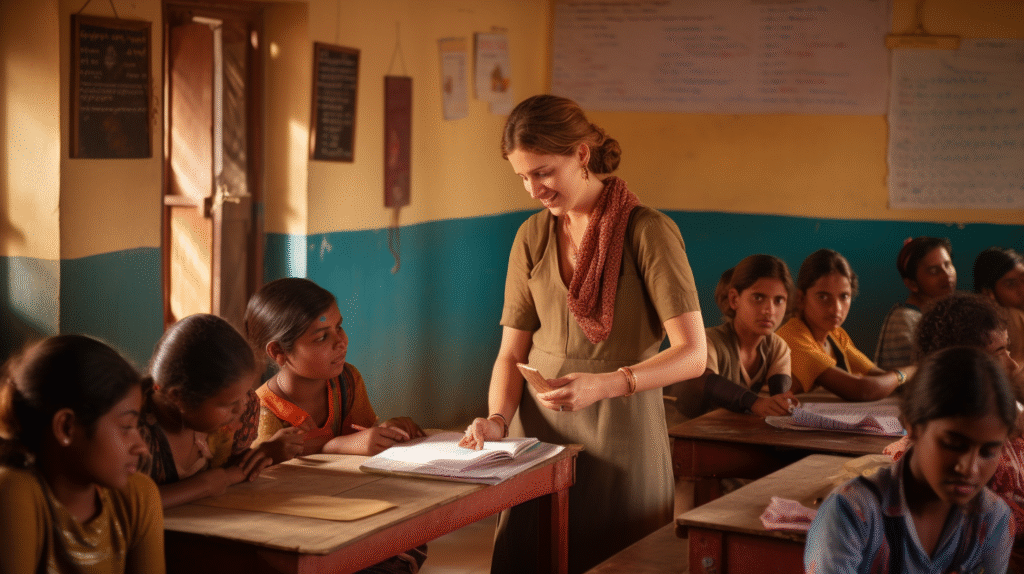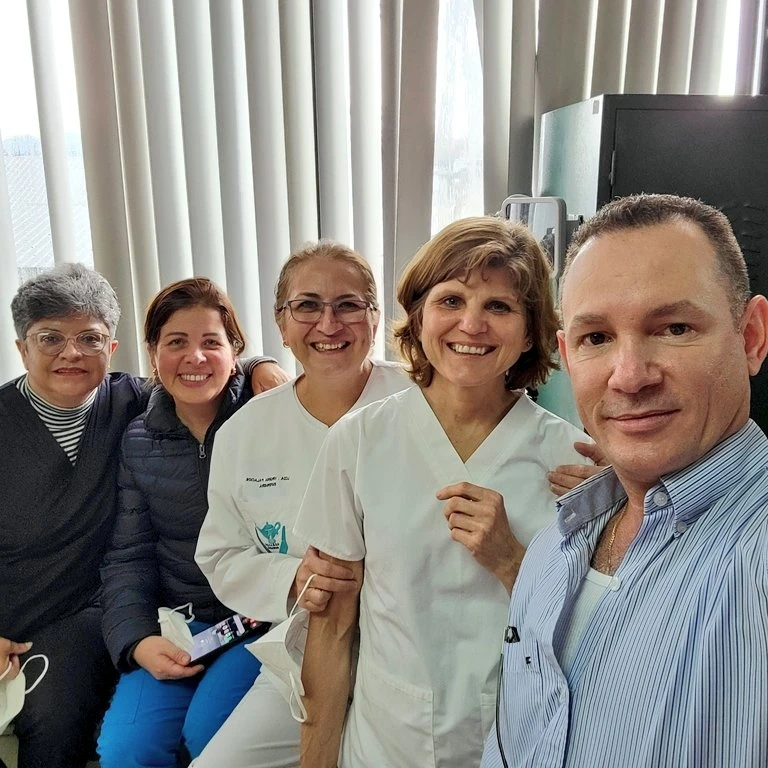Welcome to the world of volunteerism in education! As teachers, we have the incredible opportunity to not only impact the lives of our own students but also make a difference in communities near and far. By dedicating our time and skills to volunteer work, we can empower individuals, address inequalities, and foster a love for learning that extends beyond the walls of our own classrooms.
Volunteering in education is more than just lending a helping hand—it is about creating meaningful connections, acquiring new skills, and experiencing personal growth. Whether you are a seasoned educator or just starting your teaching journey, there are countless volunteer opportunities available to you. From local schools and nonprofit organizations to international programs, there is a wide range of options to choose from.

In this article, we will explore the importance of volunteerism in education, the types of volunteer opportunities for teachers, the benefits of volunteering, how to find volunteer opportunities, and how to make the most of your volunteer experience. So, let’s dive in and discover how you can make a difference in the lives of others while also enriching your own teaching practice.
Importance of Volunteerism in Education
Volunteerism in education plays a crucial role in empowering individuals and communities through knowledge and skills. By offering their time and expertise, volunteers, especially teachers, have the opportunity to make a significant impact on the lives of students and help bridge educational inequalities. Let’s dive deeper into the importance of volunteerism in education:
Enhancing Learning Experiences
Volunteers in education have the unique ability to enhance learning experiences for students in various ways. By bringing fresh perspectives and real-world experiences to the classroom, volunteers can engage students in interactive and practical activities that go beyond conventional teaching methods. This can help make learning exciting and relevant, fostering a love for learning in students.
“Volunteering in education allows teachers to create innovative and interactive learning experiences that go beyond the textbooks.” – Anonymous
Addressing Inequalities in Education
One of the critical roles of volunteerism in education is addressing inequalities in access to quality education. Many underprivileged communities around the world lack essential educational resources and qualified teachers. Through volunteering, teachers can contribute their knowledge and skills to support these communities, helping to level the playing field for students who would otherwise be left behind.
Developing Global Awareness
Volunteering in education provides teachers with the opportunity to develop a global perspective and raise awareness about global issues among their students. By promoting cultural exchange and understanding, teachers can help shape future generations who are compassionate, empathetic, and equipped to tackle global challenges. Volunteer experiences can broaden teachers’ horizons and inspire them to bring diverse perspectives into their own classrooms.
“Volunteering in education not only benefits the students but also the teachers themselves, as it broadens their understanding of the world and exposes them to diverse cultures and experiences.” – Anonymous
In the next section, we will explore the different types of volunteer opportunities available for teachers who are looking to make a difference in education.
Types of Volunteer Opportunities for Teachers
There are various types of volunteer opportunities available for teachers who are passionate about making a difference in education. Whether you have spare time to dedicate locally or want to embark on an international adventure, here are some options to consider:
1. Local Schools and Educational Institutions
Volunteering in local schools and educational institutions allows you to have a direct impact on your community. Here are a few ways you can get involved:
- Tutoring: Offer your expertise in a subject area by providing one-on-one or small group tutoring sessions to students who may be struggling academically.
- Mentoring: Become a mentor to students who may benefit from extra guidance and support. This can involve helping them set goals, develop study skills, or navigate their educational journey.
- Parent Engagement: Volunteer to support schools in their efforts to engage parents and families. This can involve assisting with events, workshops, or even starting a parent-teacher association.
2. Nonprofit Organizations
Working with nonprofit organizations focused on education can open up a range of volunteer opportunities. Some options include:
- Program Development: Collaborate with organizations to design educational programs and resources that will benefit underserved communities.
- Advocacy and Policy Work: Use your expertise to advocate for policies and initiatives that improve the quality of education. This may involve attending meetings, writing letters, or speaking at public forums.
- Professional Development: Offer your knowledge and skills by delivering workshops, training sessions, or webinars for educators in the community.
3. International Volunteer Programs
If you’re ready for a global experience, there are organizations that offer volunteer opportunities for teachers abroad. Some benefits of international volunteering include:
- Cultural Exchange: Immerse yourself in a new culture and gain a deeper understanding of different educational systems around the world.
- Teaching Abroad: Share your teaching expertise with students in developing countries who may lack access to quality education.
- Skills Development: Enhance your teaching skills by adapting to new environments, diverse classrooms, and different teaching methods.

Remember, the type of volunteer opportunity you choose depends on your availability, interests, and desired level of impact. Whether you decide to volunteer locally or embark on an international adventure, your contribution as a teacher can make a significant difference in the lives of students and communities.
Benefits of Volunteering for Teachers
Volunteering is not only a wonderful way to give back to your community, but it also offers incredible benefits for teachers. Engaging in volunteer work can significantly enhance your professional development, help you establish a supportive network, and enable you to make a positive impact on communities. Here are some of the benefits of volunteering for teachers:
1. Professional Development and Skill Enhancement
Volunteering allows teachers to gain valuable experience and develop essential skills that can enhance their teaching practice. Some of the skills you can acquire through volunteering include:
- Adaptability: Volunteering in different educational settings exposes teachers to diverse teaching methods and approaches, allowing them to adapt their teaching strategies to different learning environments.
- Leadership: Taking on leadership roles in volunteer projects enables teachers to cultivate their leadership skills, such as mentoring and guiding others.
- Collaboration: Collaborating with other volunteers, educators, and community members fosters teamwork and cooperation, skills that are valuable in any professional setting.
- Creativity: Volunteering often requires teachers to think outside the box and come up with innovative solutions to challenges, fostering their creativity and problem-solving abilities.
2. Building a Supportive Network
Volunteering provides teachers with the opportunity to connect with like-minded individuals and build a supportive network within the education community. By engaging in volunteer work, teachers can:
- Connect with Peers: Volunteering allows teachers to meet and network with other educators who share their passion for education, creating opportunities for collaboration and resource sharing.
- Mentorship Opportunities: Volunteering can provide teachers with the chance to mentor less experienced educators, providing guidance and support while strengthening their own teaching skills.
- Access to Professional Development: Through their volunteer networks, teachers can gain access to professional development opportunities, workshops, and conferences that can further enhance their knowledge and skills.
3. Making a Positive Impact on Communities
One of the most rewarding aspects of volunteering for teachers is the opportunity to make a tangible and positive impact on communities. By dedicating your time and skills, you can:
- Empower Students: Through volunteering, teachers can empower students by providing them with educational support, mentoring, and access to resources that may not be readily available.
- Create Lasting Change: Engaging in volunteer work within communities can lead to long-term positive change in education, as the impact of teachers’ contributions can extend well beyond their period of service.
- Inspire Others: By volunteering, teachers become role models and inspire others to get involved in their communities, creating a ripple effect of positive change.

Volunteering is not only a selfless act of giving, but it also offers countless personal and professional benefits for teachers. By engaging in volunteer work, teachers can enhance their skills, expand their network, and make a lasting impact on communities. So why not take the leap and explore the volunteer opportunities available to you? The rewards are limitless.
Getting Started: How to Find Volunteer Opportunities
Are you a passionate and dedicated teacher looking to make a difference beyond your classroom? Volunteering in the field of education can be a fulfilling and impactful way to contribute to your community and empower students. If you’re ready to embark on a volunteering journey, here are some steps to help you find the right opportunities:
1. Researching Local Opportunities
- Start with your local school district: Reach out to your local school district or education department to inquire about any volunteering programs they may have. Many schools welcome volunteers to assist with tutoring, mentoring, or leading extracurricular activities.
- Community centers and libraries: Community centers and libraries often offer educational programs and workshops for students. Contact them to explore opportunities where you can use your teaching skills to support these initiatives.
- Educational nonprofits: Research local educational nonprofits that focus on providing resources and support to students. These organizations often have opportunities for teachers to get involved in after-school programs or summer enrichment activities.
2. Connecting with Nonprofit Organizations
- Identify relevant organizations: Look for nonprofits in your area that specialize in education, such as those promoting literacy, STEM education, or access to quality education for underprivileged students. Reach out to them to learn more about their volunteer programs.
- Attend volunteer fairs and events: Volunteer fairs and events are great platforms to connect with various organizations and learn about the volunteer opportunities they offer. Take the opportunity to network and gather information from different organizations.
- Join online volunteer networks: Online platforms like VolunteerMatch and Idealist allow you to browse and apply for volunteer positions based on your interests and location. These platforms often have a specific category for education-related volunteer opportunities.
3. Utilizing Online Volunteer Platforms
- Create a profile: Sign up on online volunteer platforms and create a profile that highlights your teaching experience, skills, and areas of interest. This will allow organizations to find you when they look for volunteers with specific expertise.
- Search by category or location: Use the search features on these platforms to filter volunteering opportunities by education, location, or other criteria that align with your preferences.
- Read reviews and testimonials: Take the time to read reviews or testimonials from previous volunteers to get an idea of the experiences others have had with the organization or project you are interested in.
- Reach out directly: If you find a volunteer opportunity that sparks your interest, don’t hesitate to reach out directly to the organization to ask any questions you may have or express your enthusiasm for getting involved.
By following these steps, you’ll be well on your way to finding the perfect volunteer opportunity that allows you to utilize your teaching skills and contribute to educational initiatives. Remember, volunteering is a two-way street – while you offer your expertise, you also gain valuable experiences and create positive change in the lives of students and communities. So, go ahead and take the first step towards empowering education through volunteering!
Preparing for a Volunteer Experience
Embarking on a volunteer experience can be an exciting and rewarding opportunity for teachers. It allows you to make a positive impact on communities, develop your skills, and gain a deeper understanding of different cultures and educational systems. To make the most out of your volunteer experience, it is important to be well-prepared. Here are some steps to help you prepare for a meaningful volunteer experience:
Understanding Cultural Sensitivities
Before diving into a new cultural setting, it is crucial to educate yourself about the local customs and traditions. This will help you establish respectful and meaningful connections with the students and communities you will be working with. Here are some ways to understand and respect cultural sensitivities:
- Research the country and community you will be volunteering in. Learn about their customs, traditions, and values.
- Familiarize yourself with any cultural norms or taboos that you should be aware of.
- Reach out to local contacts or previous volunteers who can provide insights into the local culture.
Developing Lesson Plans and Resources
To ensure a smooth and effective teaching experience, it is important to develop lesson plans and gather resources that are tailored to the specific needs of the students and the educational system you will be working in. Here are some tips for developing lesson plans:
- Familiarize yourself with the curriculum and teaching methods used in the local educational system.
- Be flexible and adaptable in your lesson plans to accommodate any language barriers or cultural differences.
- Incorporate interactive and engaging teaching methods that promote active learning.

Building Effective Communication Skills
Communication is key in any teaching environment, and it becomes even more essential when working in a different cultural setting. Here are some ways to build effective communication skills:
- Learn basic phrases in the local language to communicate with students and community members.
- Be patient and understanding when facing language barriers. Use gestures, visuals, and other non-verbal communication methods to convey your message.
- Develop active listening skills to understand the needs and concerns of the students and community members.
By taking the time to understand cultural sensitivities, developing appropriate lesson plans, and building effective communication skills, you can ensure a more successful volunteer experience. These steps will not only help you connect with the students and communities you will be working with, but also contribute to a more positive and impactful experience overall. Preparing in advance will empower you to make the most of your volunteer experience and leave a lasting impression on the lives of those you serve.
Making the Most of your Volunteer Experience
Volunteering as a teacher can be a rewarding and transformative experience. It provides an opportunity to make a positive impact in communities and inspire students to reach their full potential. However, to make the most of your volunteer experience, it’s important to engage with students and communities, collaborate with local teachers, and reflect on and share your experience. Here are some tips to help you maximize your volunteer experience:
Engaging with Students and Communities
- Connect with the students: Build meaningful relationships with your students by showing genuine interest in their lives and aspirations. Take the time to listen to their stories and provide encouragement and support.
- Be creative with teaching methods: Engage students through interactive and hands-on activities that cater to different learning styles. Incorporate games, technology, and real-world examples to make the learning experience more enjoyable and memorable.
- Embrace cultural diversity: Respect and celebrate the cultural backgrounds of your students and the community you are serving. Incorporate multicultural content into your lessons and encourage students to share their traditions and customs.
- Get involved in community activities: Participate in community events and initiatives to further connect with the local community. This will help you gain a deeper understanding of their needs and aspirations, and allow you to contribute in a more meaningful way.
Collaborating with Local Teachers
- Establish open communication channels: Build strong relationships with local teachers by establishing open lines of communication. Share your expertise and collaborate on lesson plans, curriculum development, and teaching strategies.
- Learn from local teachers: Take the opportunity to learn from the experiences and teaching methods of local teachers. They have valuable insights into the education system, cultural nuances, and the needs of the students.
- Share your knowledge and resources: Offer to share your teaching materials, resources, and experiences with local teachers. This could include lesson plans, workshops, or training sessions that can benefit both the teachers and students.
- Promote professional development: Encourage professional development opportunities for local teachers by organizing workshops or inviting them to attend relevant conferences or training sessions. This will help them enhance their skills and expand their teaching techniques.

Reflecting on and Sharing your Experience
- Take time for self-reflection: Reflect on your volunteer experience regularly. Take note of your achievements, challenges, and lessons learned. This self-reflection will help you grow personally and professionally.
- Share your experiences: Share your volunteer experience with your colleagues, friends, and family. This will not only create awareness about the importance of volunteerism in education but also inspire others to get involved.
- Document your journey: Keep a journal or create a blog to document your volunteer journey. Share stories, photos, and insights from your experience. This will not only serve as a personal keepsake but also provide valuable information for others interested in volunteering.
- Utilize social media: Use social media platforms to share your volunteer experience. Create posts, videos, or live streams to engage and inspire others. This can have a far-reaching impact and encourage more individuals to contribute to education through volunteering.
By actively engaging with students and communities, collaborating with local teachers, and reflecting on and sharing your experience, you can truly make the most of your volunteer experience as a teacher. Remember, every effort you put into your volunteer work has the potential to make a lasting difference in the lives of students and communities. So, embrace this opportunity and empower others through education.
Conclusion
Volunteering as a teacher is not only a way to give back to the community, but it also provides numerous benefits for educators. By offering your time and expertise, you can enhance learning experiences, address inequalities in education, and develop a global awareness among students.
Through volunteer opportunities in local schools, nonprofit organizations, and international programs, teachers have the chance to make a positive impact on the lives of students and communities worldwide. These experiences also offer valuable professional development and skill enhancement, as well as the opportunity to build a supportive network of like-minded educators.
To find volunteer opportunities, research local opportunities, connect with nonprofit organizations, and utilize online volunteer platforms. It’s important to prepare for your volunteer experience by understanding cultural sensitivities, developing lesson plans and resources, and building effective communication skills.
Once you’re at your volunteer site, make the most of your experience by engaging with students and communities, collaborating with local teachers, and reflecting on and sharing your experience with others.
Volunteering as a teacher is a powerful way to empower yourself and others through education. Not only can you make a positive impact on the lives of students, but you can also grow personally and professionally. By stepping outside of your comfort zone and embracing volunteer opportunities, you can create meaningful change in the world. So why wait? Start exploring volunteer opportunities today and be a catalyst for change!
Frequently Asked Questions
- What are some volunteer opportunities for teachers?
Some volunteer opportunities for teachers include tutoring programs, mentoring programs, teaching in underserved communities or abroad, volunteering at community centers or libraries, and participating in educational initiatives or workshops.
- How can teachers find volunteer opportunities in education?
Teachers can find volunteer opportunities in education by researching local schools, non-profit organizations, or educational institutions near them. They can also reach out to community centers, libraries, or youth organizations for potential volunteer roles.
- What are the benefits of volunteering in education as a teacher?
Volunteering in education as a teacher offers various benefits, including gaining additional teaching experience, developing new skills, expanding professional networks, making a positive impact on students’ lives, and contributing to the community.
- Do I need teaching credentials to volunteer as a teacher?
Some volunteer opportunities may require teaching credentials, especially if they involve classroom teaching or working with specific educational programs. However, many organizations also value volunteers who have a passion for education and can contribute in other ways, such as mentoring or tutoring.
- Can teachers volunteer during the summer or school breaks?
Yes, teachers can volunteer during the summer or school breaks. Many organizations offer special educational programs or camps during these times, and teachers can contribute their time and expertise to support students’ learning and engagement.
-
Volunteering Abroad with Medical Missions: Make a Difference Today

Join medical group trips, Nurses Without Borders, and Dentists Without Borders to make a difference in underserved communities worldwide. Learn about the countries where these programs operate and read real-life experiences from volunteers. Volunteering overseas is an excellent opportunity to make a difference in the lives of others while experiencing new cultures and forging unforgettable…
-
Embrace Overseas Service | Transform Lives Through Global Volunteerism

International Volunteering: Discover Meaningful Travel and Transform Lives with A Broader View
-
A World of Opportunities: Unveiling the Benefits of International Volunteer Programs

Discover numerous benefits of international volunteer programs and unleash a world of rewarding opportunities with our in-depth guide.



